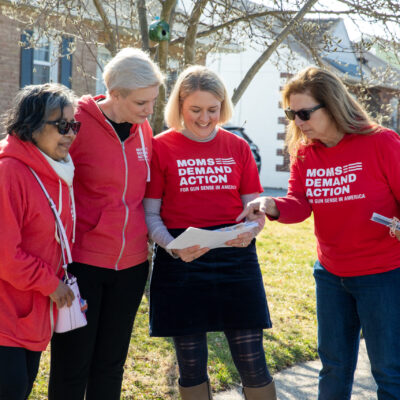Newly Uncovered Documents Reveal NRA’s Behind-the-Scenes Efforts to Create Sweeping Legal Protections for the Gun Industry
12.10.2024
Internal Documents Detail the NRA’s Public and Backroom Efforts in the 1990s and 2000s to Protect Bad Actors in the Gun Industry from Legal Accountability
Today, The Smoking Gun — an Everytown for Gun Safety Support Fund resource dedicated to exposing the gun industry’s role in our gun violence epidemic — released a new report chronicling the NRA’s efforts to protect gun manufacturers and dealers from dozens of municipal lawsuits by ushering in sweeping federal immunity.
The report centers around documents donated to the special collections archive of the University of West Georgia’s Irvine Sullivan Ingram Library by current NRA President and former Congressman Bob Barr, who served on the organization’s board of directors during his tenure in Congress. Many of the papers that he donated to the library are related to his work with the NRA, including a number of unpublished internal NRA documents and reports from the late 1990s and early 2000s.
The NRA’s efforts culminated in the passage of the Protection of Lawful Commerce in Arms Act (PLCAA) of 2005. In the nearly two decades since it was enacted, not a single gun manufacturer accused of negligence has gone to trial.
“The NRA has worked hand in hand with the gun industry, protecting them from accountability for making firearms deadlier and engaging in irresponsible marketing and sales practices,” said Nick Suplina, SVP of Law and Policy at Everytown for Gun Safety. “No industry or organization is above the law, and these newly uncovered documents further show the harm that the NRA has inflicted in its attempts to shield the gun industry. The NRA may be floundering, but the gun industry is still enjoying protections that the organization helped grant — and it’s past time that both are fully held accountable.”
- The NRA attempted to thwart lawsuits against the gun industry.
- Struggling with persistent gun violence in their streets, over 30 U.S. cities in the late 1990s brought lawsuits against gun manufacturers and dealers for their role in fueling America’s gun violence.
- As noted in the archived records of Barr, the NRA took notice of what it called the “frivolous” lawsuits against the firearms industry as early as 1999.
- Barr’s archival records indicate that the NRA’s Federal Affairs team sought to protect the gun industry from the municipal lawsuits by assembling “coalitions among business and industry groups which are coming to recognize the threat that ‘defectless product’ liability suits pose to their members, including the automobile, alcohol, and meat industries.”
- The NRA also saw the effort to protect the gun industry as yet another way to fill its coffers: At the NRA’s May 1999 board meeting, then-CFO Woody Phillips stated that the NRA’s role in opposing the municipal lawsuits “is a great fund raising issue for us.”
- The NRA developed federal legislation to protect the gun industry.
- As the NRA tracked the municipal lawsuits, the organization went on the offensive legislatively, with the ultimate goal of changing federal law so that similar lawsuits against the gun industry would be difficult, if not impossible, to bring in the future.
- Representative Barr’s papers reveal years-long legislative efforts by the NRA to provide special legal protections for the firearms industry.
- These efforts eventually culminated in the passage of the PLCAA in 2005, which was sponsored by then-Senator Larry Craig, another member of Congress who simultaneously served on the NRA board.
- The NRA’s symbiotic relationship with the gun industry persists today.
- The NRA of 2024 is a much different organization than that from the late 1990s and early 2000s; its political and organizing power is greatly reduced, as evidenced by its declining membership, revenue, and election spending.
- What hasn’t changed since the late 1990s and early 2000s is the gun industry — gun makers continue to produce increasingly deadly weapons, market them in irresponsible ways, and supply them to dealers who allow guns to fall into the wrong hands.
- The gun industry has not been compelled to reform its business practices, unlike the tobacco and automobile industries before it, due in large part to the legal protections the NRA helped draft and enact.
Read the full report here.
Last week, the New York Times reported that NRA 1st Vice President Bill Bachenberg sent a letter to board members detailing Donald Trump’s dwindling respect for the group as they continue to spiral amid financial woes and Doug Hamlin’s disastrous start as the NRA’s CEO. Bob Barr, still a key player on the NRA Board of Directors, claims that the attacks on the NRA’s legal strategy are “misinformed” and disregard “the existential threat the association has been facing.”




